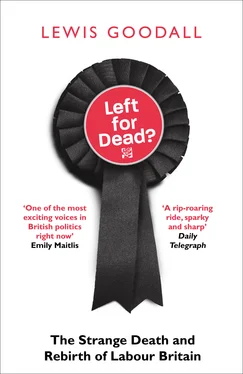And, extraordinarily, to some extent Labour brought this on itself. Throughout the New Labour years, the refrain was the same: that voters simply had to accept this new world. Do or die. Sink or swim. This was hardly inspiring talk for a party whose essential aim since its inception had been to reform industrial capitalism and alter its character. Here, 105 years after the party’s birth, its most successful electoral leader was offering it a vision of society that was less a shining city on a hill, but rather a burning one.
This repeated insistence that perpetual change was on the way and that national governments could do little to alter its path did more than just demoralise Labour’s party faithful. It helped erode the very basis of Labour’s raison d’être , in the public’s collective psyche. If even the Labour prime minister was of the view that nothing could or indeed should stand in the way of global economic forces, then what was the point of their supposed gatekeepers? Why not replace them with stewards of the free market who were true believers and ultimately had more credibility, i.e. the Conservative Party? And, true enough, as soon as Labour’s economic credibility was damaged beyond repair in the late 2000s, that is precisely what the public did.
Worse, with Labour’s retreat from the state, others have filled the vacuum. Across Europe, a similar phenomenon has occurred. Voters who have become sick and tired of social democratic politicians telling them what they can no longer do have decided to fill that space with politicians on the far right. If you take Nigel Farage’s UKIP, or Marine Le Pen’s Front National or Donald Trump, one thing unites them: their unabashed enthusiasm for state power and the pitch to voters that contrary to what they’ve been told, another world is possible. While many liberals may find the populists’ rhetoric dark and distasteful, one reason it appeals is its political and economic certainty. There is no hands-up expression of woe, no plea to global forces outside our control – all of this cast of characters offer safety and security to the dominant tribe in their respective societies: we will protect you, and your family, and we’ll use the state to do it. Whether that translates into deportation, stronger border controls, or promises of greater economic self-sufficiency, the underlying theme is the same: that of state power; that voting for some – any – sort of political change must be better than voting for parties that offer none at all. This is why the prospect of ‘taking back control’ was so potent in the Brexit referendum – it was speaking to a powerlessness that politicians, especially of the centre left, had for too long cultivated. In Scotland, in a different case, lost Labour voters turned to nationalism rather than populism but the phenomenon was essentially the same: a group of politicians expressing the belief that alternatives were possible, that the future was not set in stone. What, social democracy’s antagonists in every case implicitly and explicitly argued, do you have to lose? As Sheri Berman told me: ‘The decline of the centre left is one of the most important pre-conditions for the rise of the populist right. Not in a narrow way that people have currently focused on – that traditional left-leaning voters have shifted over to the right. That’s too simplistic. Something more profound is that in the course of the last decade, the centre left (not necessarily the far left) has lost the ability to speak effectively to the two main challenges that are facing European and American society: economic challenges and social or cultural challenges. The left has lost its voice on both these things, and so it has left the space open for parties to move in with answers to these types of things. Without the decline of the centre left both across Europe and in the US, you’d never had a political space for the rise of populism.’
It is in this where late Blair loses his connection with Labour leaders before him. He too often presented the laws of economics as if they were the laws of physics. Politics became boring and hopeless, trapped by its own confines. It removed the magic of possibility on which politics must rest. Jeremy Corbyn’s biggest virtue is perhaps that, under him, that has been restored. And if Berman is right (as I think she is) that the populism of our own age can be attributed to the decline of the centre left, and its modern inability to speak to voters, then Corbyn’s achievement to arrest that decline is all the more important. It is vital, then, to understand what he has done, just who, exactly, this rather curious man is and how he came to be there in the first place.
*I think children to begin with are natural authoritarians, responding to one leader is all they know.
†Not least because she was cold too!
‡I’ve got to the age of 28 without any so I’m pretty sure they think I’m infertile.
§To my sadness and frustration, one of Michael Gove’s first acts as education secretary was to abolish the scheme.
¶Note, not necessarily equality, of which more later.
**Yet it is forgotten now just how disappointing many socialists found the government at the time, how shoddy they thought it had become, how irritated they were with the compromises they had to make. The Conservatives have no equivalent – it would be like judging Theresa May against the actions of Macmillan or Baldwin.
††By 1943 it accounted for 54 per cent of GDP, against 24 per cent in 1938. It turned out that total war was extraordinarily egalitarian.
‡‡So-called for Finance Minister Roger Douglas. He was a Labour minister by the way.
§§This is a vast area and an important one. There is no doubt that Blair’s foreign policy helped incubate the leftist revival that was to occur in the 2010s. However, I do not go into the details of the foreign policy decisions in any great detail in this book. It seems to me to have been very well documented elsewhere.
Конец ознакомительного фрагмента.
Текст предоставлен ООО «ЛитРес».
Прочитайте эту книгу целиком, купив полную легальную версию на ЛитРес.
Безопасно оплатить книгу можно банковской картой Visa, MasterCard, Maestro, со счета мобильного телефона, с платежного терминала, в салоне МТС или Связной, через PayPal, WebMoney, Яндекс.Деньги, QIWI Кошелек, бонусными картами или другим удобным Вам способом.












